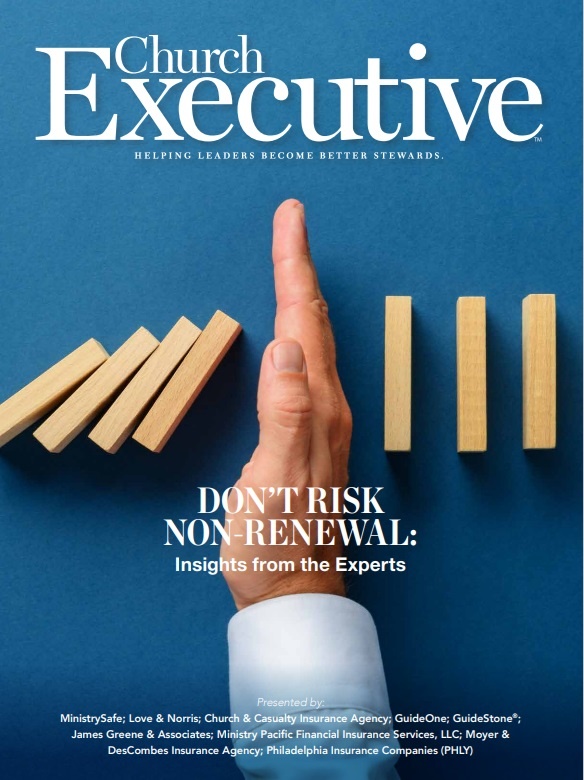
 5 strategies to implement in your church
5 strategies to implement in your church
You don’t have to be an insurance expert to know that churches are facing unique challenges with their insurance in recent years. Many well-documented factors are driving these challenges, including catastrophic weather events and rising costs — both of which are out of a church’s and insurance carrier’s control.
As a church insurance specialist since early 1981, we have assisted hundreds of churches in navigating difficult times. While it’s important to be aware of the insurance market conditions, don’t panic; instead, focus on what you can do to best position your church to prepare and minimize the impact of this predicament.

Agents/Church Specialists
Moyer & DesCombes Insurance Agency
Attention to effective risk management practices has always been important for churches and an area of emphasis for our agency, as we specialize in serving churches and non-profit ministries. With that said, it has never been more vital than it is now.
STRATEGY #1: In addition to implementing best practices in doing all a church can do to minimize property and liability risks, a church needs to have the proper insurance in place. The reality is that churches are paying more for insurance today and minimum deductibles are no longer feasible. A church needs to balance insuring for catastrophic losses and not considering insurance for small claims. A higher deductible often offsets some of the premium increases that are being driven by a variety of issues.
STRATEGY #2: From a property perspective, churches should be having their roofs, electrical, plumbing, and heating and air conditioning systems inspected regularly and making necessary repairs and updates as needed. Evidence provided to an insurer of proactivity in maintaining your buildings goes a long way in helping your church get the best pricing and terms of coverage. It is also beneficial to install the many alarms and sensors available that are both lifesaving and can minimize property damage through early detection such as sprinklers, central station burglar and fire alarms, and water sensors. Every church should have an emergency response plan that addresses their weather vulnerabilities such as tornados, hurricanes, wildfires, freezing pipes, and others.

STRATEGY #3: From a liability perspective, insurers also want to see policies and procedures in place to reduce risk. The motivation to do this should be for the church to be above reproach and desiring to safeguard the faithful entrusted to their care. Ministries should also be driven by a desire to have a positive Gospel impact rather than being vulnerable to damaging their Christian witness.
A secondary benefit is that this will help your church secure the limits of coverage needed and reduce the likelihood of being sued. Tragic events will still occur; however, when church leaders can demonstrate that they did what they could to be diligent and are prepared to respond appropriately, the damage to ministry is typically less.
STRATEGY #4: Among the churches we insure, none have been unable to secure and keep sexual misconduct liability as long as they are willing to implement child protection policies. MinistrySafe, church insurers, and agents specializing in serving churches will have samples policies that can be personalized to meet a church’s needs. The higher the limit of coverage desired, the more elements that are likely to be required in your procedures.
STRATEGY #5: The same is true for other important liability coverages. This includes counseling boundaries to reduce risk of adult-to-adult sexual misconduct, employment practices liability, board governance, religious expression, cyber liability, facility use, and church security, to name a few. There are many resources available to assist you with these, including your insurance agent, other churches, and denominational/network leadership.
A word of caution
It is important that these policies and procedures be reviewed by qualified legal counsel to be sure they are in compliance with your church’s local jurisdiction. You must also be willing to follow them consistently or they can actually be used against you — but this is no excuse not to have them in place. Failing to do so can also be viewed as a failure to do what was reasonable and prudent.
Our team has the joy of having a front row seat to seeing God’s hand demonstrated in many ministries. Unfortunately, we also have a front row seat to see when churches face trials due to sinful actions or tragic events.
In every case, when a church has carefully implemented procedures that it follows consistently — and is ready to respond appropriately — it endures the hardship with less negative impact.
Becky Moyer and her husband, B.J. Moyer, founded Moyer & DesCombes Insurance Agency [ www.moyerinsuranceagency.com ] more than 30 years ago, specializing in insuring churches and other religious organizations. She is a pastor’s daughter and serves on the finance team in her local church.
Denise DesCombes began in insurance with a large brokerage firm. In 2000, she joined Moyer & DesCombes, specializing in commercial business. She serves as a church insurance specialist and also works with commercial non-profit insurance. DesCombes is involved in a local church and serves in various ministry roles.


